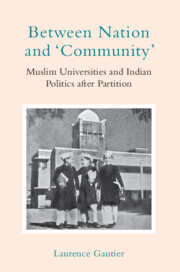Book contents
- Frontmatter
- Dedication
- Contents
- List of figures
- List of tables
- Acknowledgements
- A note on transliteration and translation
- List of abbreviations
- Introduction
- 1 A laboratory for composite India: Jamia Millia Islamia around the time of partition
- 2 Sifting Sir Syed’s legacy: From the ‘arsenal of Muslim India’ to a symbol of India’s national integration?
- 3 Re-legitimising minority rights: The campaign for Aligarh Muslim University’s minority status
- 4 Resisting minority politics, holding on to composite nationalism: Jamia Millia Islamia in the post-Nehruvian period
- 5 Uplifting backward Muslims: The new consensus?
- 6 Bastions of Islam: The defence of Islam as a narrative of empowerment and contestation
- 7 Women in Muslim universities: Guardians of tradition or actors of change?
- Conclusion
- Appendix
- Glossary
- Bibliography
- Index
5 - Uplifting backward Muslims: The new consensus?
Published online by Cambridge University Press: 15 April 2024
- Frontmatter
- Dedication
- Contents
- List of figures
- List of tables
- Acknowledgements
- A note on transliteration and translation
- List of abbreviations
- Introduction
- 1 A laboratory for composite India: Jamia Millia Islamia around the time of partition
- 2 Sifting Sir Syed’s legacy: From the ‘arsenal of Muslim India’ to a symbol of India’s national integration?
- 3 Re-legitimising minority rights: The campaign for Aligarh Muslim University’s minority status
- 4 Resisting minority politics, holding on to composite nationalism: Jamia Millia Islamia in the post-Nehruvian period
- 5 Uplifting backward Muslims: The new consensus?
- 6 Bastions of Islam: The defence of Islam as a narrative of empowerment and contestation
- 7 Women in Muslim universities: Guardians of tradition or actors of change?
- Conclusion
- Appendix
- Glossary
- Bibliography
- Index
Summary
The University shall have the powers … to promote especially the educational and cultural advancement of the Muslims of India.
—AMU (Amendment) Act (1981)The way the traditional Muslim leaders reacted to the Babri Masjid issue made me think that there was an urgent need for the Dalit Muslims to come up with their own leaders, championing bread-and-butter concerns rather than emotional and symbolic issues…. Our first concern should be jobs and education for our people … the traditional Muslim leadership has been championing merely symbolic issues, be it the cause of Urdu, the minority character of the Aligarh Muslim University, Muslim Personal Law or the Babri Masjid.
—Ejaz Ali, leader of the All-India Backward Muslim MorchaThe demolition of the Babri Masjid in December 1992 constituted for many Indian Muslims, as well as for a great many other Indian citizens, a shocking landmark moment in the history of the republic. For Mushirul Hasan, Muslims’ response to this ‘cataclysmic event’ was one of ‘anger, indignation and disbelief ‘. The demolition laid bare the state's failure to uphold the rule of law and to protect its minority population from the attacks—physical and symbolic—of self-legitimising Hindutva forces. For many, this was a devastating blow not only against Muslims but against the very idea of India as a secular democracy.
This was also a moment of reckoning for Muslim leaders. A number of individuals and organisations called for a radical transformation of Muslim politics. In their minds, established Muslim leaders were partly to blame for this ‘cataclysm’. By focusing on divisive ‘emotive and symbolic issues’, they had contributed to the sharp rise of communal tensions and failed to protect Muslims. The demolition of the Babri Masjid thus prompted the emergence of new backward Muslim (pasmanda) organisations, such as Ejaz Ali's All-India Backward Muslim Morcha, which rejected these ‘traditional Muslim leaders’ and their claim to speak for all Muslims. The ‘emotive and symbolic issues’ that they stood for (including AMU's status) mattered to Muslim elites alone, they suggested. These organisations instead called pasmanda Muslims to ‘come up with their own leaders’ to champion ‘bread-and-butter issues’.
- Type
- Chapter
- Information
- Between Nation and ‘Community'Muslim Universities and Indian Politics after Partition, pp. 229 - 283Publisher: Cambridge University PressPrint publication year: 2025



